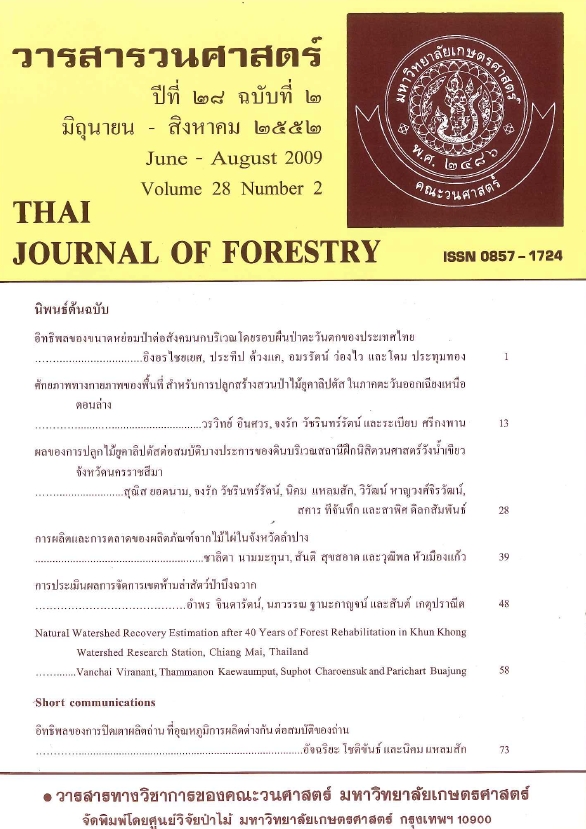อิทธิพลของการปิดเตาผลิตถ่าน ที่อุณหภูมิการผลิตต่างกัน ต่อสมบัติของถ่าน
Main Article Content
บทคัดย่อ
การศึกษาอิทธิพลของการปิดเตาผลิตถ่าน ที่อุณหภูมิการผลิตต่างกัน ที่มีผลต่อสมบัติของถ่าน เป็นการศึกษาการผลิต และสมบัติของถ่าน เมื่อระดับอุณหภูมิของการปิดเตาต่างกันที่ 3 ระดับ คือ 500, 600 และ700 องศาเซลเซียส โดยใช้เตาผลิตถ่านไทย-อิวาเตะ ซึ่งใช้ไม้ยูคาลิปตัสคามาลดูเลนซิส อายุ 3-5 ปี ขนาดเส้นผ่านศูนย์กลาง 1.5-4 นิ้ว นำไม้ผึ่งไว้ในกระแสอากาศเป็นเวลา 4 สัปดาห์ ก่อนนำไปใช้เป็นวัตถุดิบ (ความชื้นไม่เกิน ร้อยละ 40)
จากการศึกษาสมบัติของถ่าน ได้แก่ ผลผลิตของถ่าน ปริมาณความชื้น ปริมาณถ่านคงตัว ปริมาณสารระเหย ปริมาณเถ้า ค่าความร้อน และความหนาแน่น ส่วนสมบัติของน้ำส้มไม้ดิบ ได้แก่ ผลผลิตของน้ำส้มไม้ดิบ ความถ่วงจำเพาะ ค่าพีเอช สี กลิ่น และความใส พบว่า ในการผลิต 1 รอบ (ปริมาตรภายในของเตา 12 ลูกบาศก์เมตร) ใช้เวลา 15 วัน ปริมาณไม้เฉลี่ย 5,607 กิโลกรัม สมบัติของถ่านชั้นบนมีปริมาณถ่านคงตัว และค่าความร้อนมากกว่าถ่านชั้นล่างในแต่ละอุณหภูมิที่ปิดเตา โดยมีค่าคาร์บอนเสถียรสูงสุด ร้อยละ 82.0 และค่าความร้อนสูงสุด 7,480 กิโลแคลอรี/กิโลกรัม ที่อุณหภูมิการปิดเตา 700 องศาเซลเซียส ของถ่านชั้นบน เมื่อนำมาวิเคราะห์ข้อมูลทางสถิติ โดยใช้โปรแกรมสำเร็จรูปทางสถิติ วิเคราะห์ความแปรปรวน และใช้การเปรียบเทียบโดยวิธีของ Duncan’s Multiple Range Test (DMRT) พบว่า ในถ่านชั้นบน อุณหภูมิที่ปิดเตา 500, 600 และ 700 องศาเซลเซียส ไม่มีความแตกต่างทางสถิติอย่างมีนัยสำคัญต่อสมบัติของถ่าน ในถ่านชั้นล่าง อุณหภูมิที่ปิดเตา 500, 600 และ 700 องศาเซลเซียส มีผลต่อปริมาณถ่านคงตัว และค่าความร้อน มีค่าเฉลี่ยของกลุ่มอย่างน้อย 1 คู่ ที่แตกต่างกัน เมื่อวิเคราะห์เปรียบเทียบทีละคู่พบว่า อุณหภูมิ 500 องศาเซลเซียส อยู่คนละกลุ่มกับอุณหภูมิ 700 องศาเซลเซียส จากผลการวิจัย การผลิตถ่านในวิธีการทดลองนี้ควรเลือกการปิดเตาที่อุณหภูมิ 700 องศาเซลเซียส เพราะให้ค่าความร้อนสูง ปริมาณถ่านคงตัวสูง และมีปริมาณสารระเหยน้อย ซึ่งเป็นสมบัติของถ่านที่มีคุณภาพสูง
คำสำคัญ: เตาผลิตถ่านไทย-อิวาเตะ สมบัติของถ่าน
Downloads
Article Details

อนุญาตภายใต้เงื่อนไข Creative Commons Attribution-NonCommercial-NoDerivatives 4.0 International License.
ข้าพเจ้าและผู้เขียนร่วม (ถ้ามี) ขอรับรองว่า ต้นฉบับที่เสนอมานี้ยังไม่เคยได้รับการตีพิมพ์และไม่ได้อยู่ในระหว่างกระบวนการพิจารณาตีพิมพ์ลงในวารสารหรือสิ่งตีพิมพ์อื่นใด ข้าพเจ้าและผู้เขียนร่วม (ถ้ามี) ยอมรับหลักเกณฑ์และเงื่อนไขการพิจารณาต้นฉบับ ทั้งยินยอมให้กองบรรณาธิการมีสิทธิ์พิจารณาและตรวจแก้ต้นฉบับได้ตามที่เห็นสมควร พร้อมนี้ขอมอบลิขสิทธิ์ผลงานที่ได้รับการตีพิมพ์ให้แก่วารสารวนศาสตร์ คณะวนศาสตร์ มหาวิทยาลัยเกษตรศาสตร์ กรณีมีการฟ้องร้องเรื่องการละเมิดลิขสิทธิ์เกี่ยวกับภาพ กราฟ ข้อความส่วนใดส่วนหนึ่ง หรือ ข้อคิดเห็นที่ปรากฏในผลงาน ให้เป็นความรับผิดชอบของข้าพเจ้าและผู้เขียนร่วม (ถ้ามี) แต่เพียงฝ่ายเดียว และหากข้าพเจ้าและผู้เขียนร่วม (ถ้ามี) ประสงค์ถอนบทความในระหว่างกระบวนการพิจารณาของทางวารสาร ข้าพเจ้าและผู้เขียนร่วม (ถ้ามี) ยินดีรับผิดชอบค่าใช้จ่ายทั้งหมดที่เกิดขึ้นในกระบวนการพิจารณาบทความนั้น”


